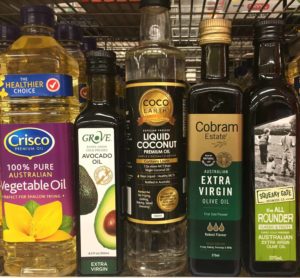
I’d like to demist a few of the fallacies surrounding fats and oils, more particularly what’s great to use cold and what’s good to cook with.
Too much information often leads to confusion and thus we sort of just give up and grab whatever’s closest, which may not be healthy. We all know fat and oil makes food taste great. It gives flavours more depth and enhances them like nothing else does and finally, there’s scientific proof that fats and oils can be good for us! HOORAY for modern day science! However, many health professionals including myself will still suggest using everything in moderation and to always be mindful of the quality and source of what you choose to consume. The quality and source of fat and oil is very important especially if you’re heating it or using it in your baking.
A simple a rule of thumb is: ‘If it’s solid at room temperature it’s safe for cooking,’ with very few exceptions. The reason for this is solid fats or oils are more stable at higher temperatures.
Let’s go through a few fats and oils used for cooking: coconut oil is perfect, vegetable oil – there’s enough scientific research to support avoiding this one for most uses. Ghee is fine, lard is great, olive oil is okay for some cooking, extra virgin olive oil – maybe not, avocado oil – maybe not.
Let’s roll back a little. Why a maybe not for avocado oil and EVOO? Avocado oil, extra virgin olive oil (especially) and other similar oils have many health benefits at room temperature but may not be as good for cooking as we’ve always thought. Although they have been popular for a long time and the food and health industries have promoted them as the healthy fat that can be used for everything, new research has shown that heating some oils over specific temperatures can break down or oxidize it. This is what those ever-so-loving antioxidants that you consume work so hard to clean up and we want to help our antioxidants out as much as possible, which we can by avoiding oxidized oils.
To do this, choose the right oil for its purpose, and base it on source and smoke point. If you’re cooking above 160 degrees Celsius, choose a fat or oil with a high smoke point like Ghee (Clarified butter) or coconut oil. The smoke point of the oil is normally easy to find if you do a quick search and most products will have the smoke point on the label. Save the Evoo and other delicate oils for more gentle low heats or even after plating your food, they’re great as a salad dressing or a last minute drizzle on your fresh food to enhance the flavours while keeping the nutrient value of the oil true.
I always encourage clients and people I help to do a little research into what they’re using and eating so they are empowered with knowledge that helps them make healthy choices and I strongly encourage readers to as well.
By Holly Kendall of Holly Kendall Organics http://www.hollykendallsorganics.com.au
Holly Kendall’s Organics, provides families with easy access to fresh, seasonal certified organic produce sourced from Australian farms where it is grown free of chemicals or pesticides and hasn’t been subjected to any long term storage. The business is operated with the help of her family, from her small organic farm in the hills of Wandong, Victoria.
